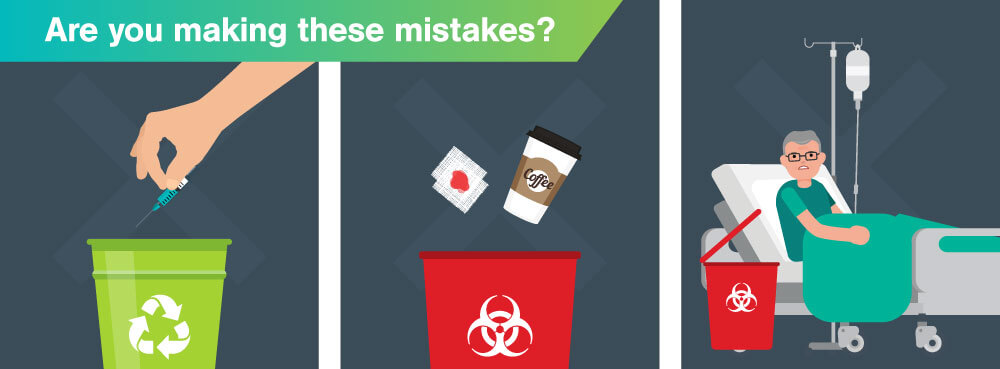Navigating Medical Garbage Disposal: Important Solutions for Health Care Facilities
In the intricate landscape of healthcare operations, the management of clinical waste is an important aspect that demands precise interest. Health care facilities, whether little centers or big health centers, are turned over with the duty of handling, dealing with, and throwing away a large selection of clinical waste streams. The intricacies entailed in browsing with the governing demands, ensuring proper waste partition, and carrying out secure collection and transport processes are paramount. Understanding the vital services that support clinical waste disposal is not just an issue of conformity but also an essential component in safeguarding public health and ecological wellness. The intricacies of this procedure are essential for healthcare facilities, and the experience provided in this world plays an essential function in keeping the integrity of health care systems.
Regulatory Conformity Support
For medical care centers, guaranteeing governing conformity support is vital to keep appropriate handling and disposal of clinical waste. By partnering with regulative conformity experts, healthcare facilities can stay current on advancing guidelines, mitigate risks associated with incorrect waste disposal, and eventually add to a safer and a lot more lasting environment for all.
Waste Segregation Guidance

Medical care centers should give clear guidelines and training to team on how to segregate waste efficiently. This includes separating basic waste from unsafe products such as sharps, contagious waste, drugs, and chemical waste.
Collection and Transport Providers

Correct collection and transportation services are essential components of the medical garbage disposal process in medical care facilities. These solutions guarantee that unsafe materials are dealt with securely and in compliance with regulations to secure both the atmosphere and public health. Health care centers depend on specialized waste administration companies to supply reliable collection and transport services customized to their demands.
Clinical waste collection includes segregating various kinds of waste at the point of generation, making use of color-coded bags or bins to distinguish in between general, unsafe, pharmaceutical, and various other waste streams. Trained employees need to execute this task to avoid contamination and ensure correct disposal. Once gathered, the waste is moved in dedicated lorries geared up to take care of dangerous products safely. These cars stick to rigorous safety criteria and adhere to designated courses to qualified treatment facilities for disposal through methods such as landfilling, incineration, or sterilization.
Therapy and Disposal Solutions
In the realm of clinical waste disposal for health care centers, after the essential stage of collection and transport services, the emphasis changes in the direction of carrying out effective treatment and disposal remedies. Treatment options commonly involve procedures such as autoclaving, which utilizes steam under pressure to disinfect the waste.
Disposal options include the last action in the medical waste management procedure. Recycling and resource healing are additionally gaining traction as sustainable disposal choices for particular types of clinical waste products.
Reliable therapy and disposal remedies are paramount in making certain conformity with regulations and safeguarding public wellness and the atmosphere. Healthcare centers must meticulously review and pick suitable techniques that align with their waste administration objectives and sustainability initiatives.
Personnel Training and Education

To effectively take care of medical garbage disposal in medical care facilities, detailed team training and education play a vital function in guaranteeing adherence to regulative requirements and keeping a secure environment. Correct training equips personnel with the expertise and abilities needed to handle various types of medical waste, segregate them correctly, and package them firmly for disposal. By enlightening employees on check out here the risks connected with improper handling of clinical waste, facilities can decrease the chance of accidents, contamination, and regulatory violations.

Final Thought
In final thought, medical care centers count on important medical garbage disposal services to guarantee governing compliance, appropriate waste partition, safe collection and transportation, reliable therapy and disposal, in addition to team training and education. These services play an important function in maintaining the health and wellness of both healthcare workers and the general public, highlighting the value of correct administration of medical waste in medical care settings.
For medical care facilities, making certain regulative conformity assistance is important to preserve proper handling and disposal of clinical waste. Waste partition involves categorizing various kinds of clinical waste to ensure ideal handling, therapy, and disposal. This consists of separating basic waste from hazardous products such as sharps, contagious waste, drugs, and chemical waste.Medical waste collection involves setting apart different types of waste at the point of generation, using color-coded bins or bags to differentiate between basic, hazardous, pharmaceutical, and various other waste streams.In the world of medical waste disposal for health care facilities, after the vital phase of collection and transport services, the focus shifts towards carrying out check my site efficient therapy and disposal remedies.